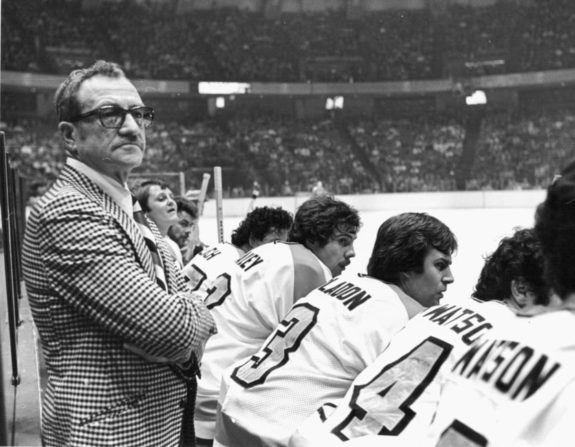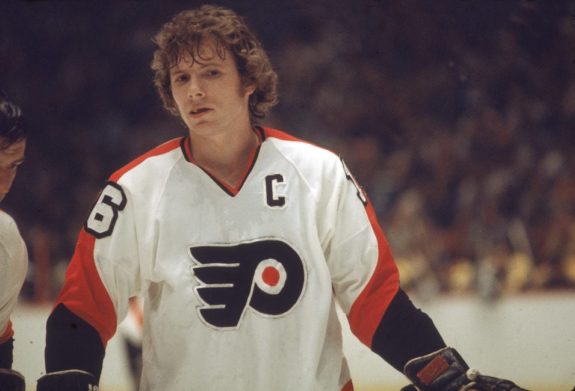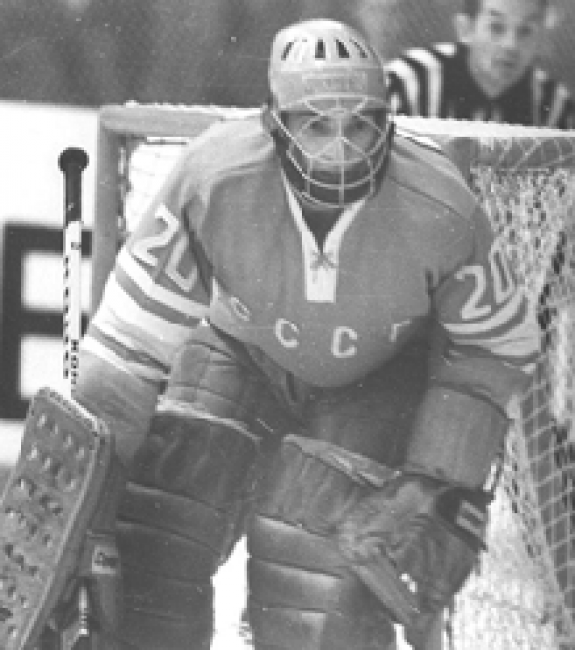The Philadelphia Flyers had the entire National Hockey League rooting for them on Jan. 11, 1976.
That was an unusual occurrence for the “Broad Street Bullies,” who had used a combination of Bernie Parent’s goaltending, an attack led by Bobby Clarke, Bill Barber and Reggie Leach, and coach Fred Shero’s adaptation of Conn Smythe’s famous adage, “If you can’t beat ‘em in the alley, you can’t beat ‘em on the ice.” Shero’s team set NHL records for penalty minutes and were the most despised team in the league — but the Flyers entered their much-anticipated game against the Soviet Red Army game at the Spectrum as two-time defending Stanley Cup champions.
For a change, they had the NHL behind them.
“All year long people keep telling us that we’re bad for hockey, bad for the NHL, bad for Canada because we’re too rough,” Shero said before the showdown. “Now we’re supposed to save the game for the NHL, for Canada, for everyone. Hah! For the first time, we’re the good guys.”

Shero had an advantage that Red Army’s three previous opponents – the New York Rangers (7-3 loss), Boston Bruins (5-2 loss) and Montreal Canadiens (3-3 tie) didn’t have: an unlikely friendship with Anatoli Tarasov, the “Father of Soviet hockey.” Shero borrowed ideas on practice methods and game strategies from Tarasov and combined them with his own philosophies. For example, forwards couldn’t turn their backs to the puck. Blind centering passes in the offensive zone were forbidden, as were diagonal passes in the defensive zone.
There was one aspect of hockey that the two disagreed on. Shero eschewed the Soviets’ emphasis on sweep checks, instead emphasizing having his players get a good angle on opponents and take the body.
Shero’s Simple Strategy
For the game against the perennial Soviet League champions, Shero had his players focus on protecting their blue line and do their best to contain Red Army’s slick passing attack. He also instructed his players to hang onto the puck in the offensive zone, accurately figuring that the Soviets couldn’t counter-attack without the puck.
“You can have the puck between the blue lines all night long, but it won’t do you any good if you can’t get in,” Clarke said of Philadelphia’s strategy. “We could let them do it all game and still beat them.”
After a get-together the night before the game that was chillier than the coldest Philadelphia winter, the teams faced off on a Sunday afternoon at the Spectrum, with Kate Smith’s version of “God Bless America” replacing the U.S. National Anthem. Shero’s strategy was evident from the start — the Flyers clogged the neutral zone rather than chase the puck when the Soviets had it, and they banged every red-and-white sweater they could find.

Clarke and Mel Bridgeman took advantage of the Soviets’ weakness in the faceoff circle, giving Philadelphia an edge in puck possession.
Philadelphia had outshot the Soviets 12-1 by the midway point of the first period, with goalie Vladislav Tretiak the only one keeping Red Army from being blown out. The Flyers’ penalty-killers further frustrated the Soviets, killing off penalties to Moose Dupont and Ed Van Impe. Philadelphia continued to bang bodies, most notably on a hit by Van Impe, who came out of the penalty box and leveled Valeri Kharlamov. The Soviet star went down and stayed down for a long time.
Pulling His Team
The Soviets were furious at referee Lloyd Gilmour’s no-call on the hit by Van Impe. Coach Konstantin Loktev ordered his players to the bench and threatened to pull his team if Gilmour didn’t penalize the hit on Kharlamov; Gilmour threatened to call a delay of game penalty if the Soviets didn’t return to the ice immediately.
Instead, Loktev and his players headed for the locker room amid a cascade of catcalls. But while the fans and the Philadelphia players were puzzled, Shero wasn’t surprised.
“I’ve seen them do that before,” he said after he game. “It’s a tactic they use sometimes when the game isn’t going their way. They always come back.”
They did, though the reason was likely a more basic one. The Soviets hadn’t been paid for their four games against the NHL teams, and Flyers owner Ed Snider told Loktev and officials from the Soviet delegation that they wouldn’t get a penny of the $200,000 guarantee unless the game resumed.
Money talked, so 16 minutes after the Soviets left the ice, they returned to another barrage of booing. The boos turned to cheers 17 seconds after play resumed when Leach beat Tretiak during the power play stemming from the delay of game call to put the Flyers ahead 1-0. Rick MacLeish’s breakaway goal made it 2-0 after one period, with the Flyers outshooting the Red Army 17-2.
Defenseman Joe Watson bumped the lead to 3-0 when he put a rebound past Tretiak 2:44 into the second period before Viktor Kutergin got Red Army on the board at 10:48, cutting Philadelphia’s lead to 3-1.
Flyers Lock It Down
But the third period belonged to the Flyers, who cleaned up their act slightly and kept firing away at Tretiak, Larry Goodenough, a rookie defenseman, scored 4:01 into the third period to give Philadelphia a three-goal lead — and for the remaining 14:59, the Flyers put on a textbook show of smart, physical hockey. The slick Soviet-style focused on the quality of shots, not the quantity, but it’s tough for any team to win when it’s outshot 49-13.
Even down three goals, Loktev wouldn’t change his team’s style of play; he continued to have his players circling, looking for the perfect scoring opportunity rather than playing dump and chase, and the Flyers succeeded in bottling up the neutral zone, preventing the Soviets from gaining any speed.
Tretiak did nothing to diminish his reputation as one of the world’s great goalies, but the Flyers cruised to a 4-1 win despite not having Parent available due to injury. The goal by Kutergin was the only one allowed by Wayne Stephenson, who spent much of the afternoon watching Tretiak stand on his head to keep the game close. (from ‘When the Flyers beat the Red Army,’ Philadelphia Inquirer, 01/23/2015)

“If it wasn’t for Tretiak,” Flyers forward Gary Dornhoefer said, “I think we’d have hit double figures.”
The Soviets complained afterward that the Flyers had played “animal hockey.” Many people around the NHL countered that the win showed the superiority of North American hockey.
Clarke, who had played a key role in Team Canada’s victory against the Soviet National Team in the 1972 Summit Series, didn’t agree with either view.
‘Better than Their Best’
“This doesn’t prove Canadian hockey is better than theirs,” he said in the jubilant locker room following the game. “It just means the Flyers are better than their best.”
The Flyers’ style stifled the Soviets — but ironically, any claim that they were hockey’s best team wouldn’t last long. Four months after defeating Red Army, the Flyers were swept by the Montreal Canadiens in the Stanley Cup Final. Not only did they come up short in their quest for a three-peat, but they also haven’t won the Cup since.